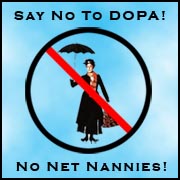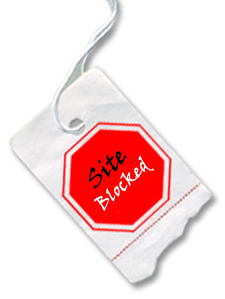Deleting Online Predators Act
Article by Samantha CollinsOn May 9th, 2006, a bill titled the Deleting Online Predators Act (DOPA) went before the United States House of Representatives. The goal of DOPA was to protect minors when using potentially threatening social networking sites in the absence of guardians. Also, the bill would expand the Children�s Internet Protection Act (CIPA) and amend the Communications Act of 1934.
DOPA Objectives
DOPA would be an expansion of CIPA. CIPA already requires �schools and libraries that receive federal funding to block access� indelicate materials. DOPA would require them to enforce a �policy of internet safety for minors� by restricting access to commercial social networking sites. �Commercial� social networking sites is defined as, �a commercially operated internet website that allows users to create web pages or profiles that provide information about themselves and are available to other users; and offers a mechanism for communication with other users, such as a forum, chat room, e-mail, or instant messenger.�
Also in the bill was a proposed Advisory board. The bill states that the Federal Communications Commission will establish the board, and will have eight members appointed by the Chairman of the Commission. The purpose of the board would ultimately be to help publish �a list of commercial social networking sites and chat rooms that have been shown to allow sexual predators easy access to personal [and contact] information of�children.� The bill also included a website and consumer alert within 90 days of the enactment of DOPA.
The bill has been revised twice since it�s original pass through the House of Representatives. In those two revisions, the advisory board proposition was been eliminated, and the consumer alert and website were time limit was extended to 180 days.
You can see all three versions of the DOPA bill below:
1. http://www.gpo.gov/fdsys/pkg/BILLS-109hr5319ih/pdf/BILLS-109hr5319ih.pdf
2. http://www.gpo.gov/fdsys/pkg/BILLS-109hr5319eh/pdf/BILLS-109hr5319eh.pdf
3. http://www.gpo.gov/fdsys/pkg/BILLS-109hr5319rfs/pdf/BILLS-109hr5319rfs.pdf
Controversy

The issue that surrounded DOPA was that the definitions in the bill were so broad. Though politicians' goal was to prevent minors from access to websites like MySpace and Facebook, it could also end up preventing access to sites like LinkedIn, Blogs, and Wikipedia. These are sites that minors sometimes use for scholastic purposes. Plus, it was unclear if the bill would restrict �safe sites� like Gaggle.net, a social networking site for students (not unlike Facebook), that was created as a safe place for students, away from sexual predators.
Also, websites such as MySpace, Xanga, and Tagged already have dedicated security teams within, many of them with a background in law enforcement and internet safety. These details just reinforced arguments that DOPA was a redundant bill. Democratic Representative John Dingell argued that DOPA would be �a piece of legislation which is going to be notorious for its ineffectiveness.�
Life of DOPA

After an overwhelming vote by the House of Representatives (410-15), it seemed without a doubt that DOPA would reach the President's desk, but the criticism began to catch up with it. Senator Patrick Leahy expressed concerns over DOPA, and then examined the bill, slowing its progression. Then, after a scandal and many lost re-elections by DOPA supporters, Congress turned over from Republican to Democrat control, and the new leadership never brought the bill to the Senate floor. Despite the initial wave of support, the Deleting Online Predators Act was never passed. Only time will tell if a new and improved DOPA look-a-like will emerge.
Sources and Additional Reading
School Library Journal - House Republicans Introduce Bill to Thwart Online Predators
TGDaily - DOPA Overwhelmingly Passes House
CNet News - Chat Rooms Could Face Expulsion
CBS News - Opinion: House Misfires on Internet Safety
